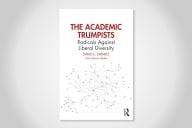You have /5 articles left.
Sign up for a free account or log in.
SEATTLE -- Donna Rotunno, attorney for Me Too-era symbol of predation Harvey Weinstein, recently told Vanity Fair, “I feel that women may rue the day that all of this started when no one asks them out on a date, and no one holds the door open for them, and no one tells them that they look nice.”
Academics who study gender were quick to poke fun at the Nostradamus-of-chivalry-style declaration. Me Too-era philosopher Kate Manne, associate professor at Cornell University, for instance, responded on Twitter, “We’ll chance it.”
Quips aside, a deep critique of Me Too is happening in academe. Case in point: several sessions at the Modern Language Association’s recent meeting here were dedicated to the movement. Me Too was also the subtext for numerous other panels on gender and race in literature and on academic culture.
The message? Me Too has a literary and cultural history. It has implications for how feminists of different “waves” understand each other, and for criminal justice. It’s not all good -- or bad. And it's already changed academe.
During a panel on historicizing Me Too, for example, Courtney Chatellier, a lecturer of language at New York University and scholar of women's intellectual history, discussed Victoria Woodhull’s “late-Victorian call-outs.”
Woodhull, the first woman in the U.S. to run for president, was arrested along with her sister in 1872 for publishing pamphlets that sought to expose sexual indiscretions and abuses by powerful New York men, including Henry Ward Beecher. Woodhull’s goal was not to punish Beecher, whom she accused of adultery, Chatellier explained, but rather to demonstrate his alleged hypocrisy in not joining her for calls for a sexual revolution.
Women who named men during the Me Too movement have faced legal threats, and Woodhull, too, faced charges -- of obscenity, in the case of the Beecher article. Woodhull was not found guilty, but Chatellier explained that she faced major backlash, with critics employing many of the same arguments that Me Too detractors make now: that “men’s lives matter,” Chatellier said, and that -- in the words of writer and accused harasser Stephen Elliott -- “These people on the left aren't liberals at all, actually.”
“What I find interesting is the way that over and over we see how these accusations against powerful men are recast as affronts to liberalism,” Chatellier continued, citing the attacks on Anita Hill as another historical example. “The women and, in some cases, the men driving the Me Too movement inaugurated by [Woodhull] of going outside the structures of the criminal justice system -- structures that have failed victims of sexual harassment and assault over and over -- seek acknowledgment, justice and change."
Yet rather than "attacking the pillars of liberalism, as their critics charge," she said, "these women have revealed and continue to reveal the hollow promises of liberalism," or what historian Emily Owens has called the “fantastical imaginary of American liberalism in which equality simply exists.”
During the same panel, Jennie Lightweis-Goff, an instructor of English at the University of Mississippi, criticized the “wave” schema of feminism -- think second wave and third wave -- which she said parses feminism into generations instead of ideas.
Me Too has exposed these rifts, she said, such as when writer Katie Way squared off with journalist Ashleigh Banfield over Way’s interview with the anonymous woman who shared an uncomfortable -- but not criminal -- sexual encounter with the comedian Aziz Ansari. Banfield called Way “reckless,” and Way allegedly wrote to Banfield’s producer via email that Banfield is “someone I am certain nobody under the age of 45 has heard of.” Way also hoped that “the 500 retweets on the single news write-up made that burgundy lipstick, bad highlights, second-wave feminist has-been really relevant for a little while.”
Lightweis-Goff also highlighted the spectrum that is Me Too, in which allegations of criminal assault have been lumped together with accounts of men being uncriminally bothersome. She said that campaigns such as the Hollywood-based Time's Up and its legal defense fund have driven the movement toward the “carceral” -- something that should be interrogated in an era of mass imprisonment and its intersections with race.
“How might Me Too activists respond to anti-prison critiques of black feminist thinkers?” Lightweis-Goff asked. She noted that that she has taught in prisons, worked toward prison reform and always been skeptical of “easy punitive solutions.”
The “one thing that trickles down in America is not money,” she added. “It’s punishment.”
Lightweis-Goff acknowledged the complexity surrounding extralegal means of addressing Me Too, however, saying that sexual offenders are often unwelcome in restorative justice circles. She noted, too, the consequences that remain for women who speak out against their offenders. Christine Blasey Ford, she said, was forced to move out of her home after speaking out against Brett Kavanaugh, while he sits on the U.S. Supreme Court.
A separate session on theorizing Me Too touched on some similar ideas, including whether Me Too is -- in the words of panelist Joseph Fischel, associate professor of women's, gender and sexuality studies at Yale University -- "revitalized feminism, a reinvention of sorts, or a sex panic." Fischel's short answer was "yes, and possibly." His longer answer drew heavily on the work of feminist legal scholar Catharine MacKinnon and concluded with a lament that we don’t have better ways to talk about bad sex -- but not rape -- beyond simple notions of consent and non-consent.
Several of Fischel's co-panelists noted that the original coiner of the phrase "Me Too," activist Tarana Burke, never intended it to be punitive -- or even a hashtag, as in #MeToo. Rather, Burke has said it was conceived as a way to build empathy and connection among those affected by harassment and assault.
Another panel called “Grown-Ass Women”: Understanding and Teaching Angry Texts in Several Genres, didn’t have Me Too in its name -- just its DNA. This included a discussion of texts including Phoebe Gloeckner’s Diary of a Teenage Girl: An Account in Words and Pictures and Marie Calloway’s What Purpose Did I Serve In Your Life, and works by feminist Audre Lorde and writers Chimamanda Ngozi Adichie and Soraya Chemaly.
Speakers noted that women who are angry have, over millennia in life and in literature, been silenced -- by physical means (think Philomela’s tongue), institutionally (the hospitalization of “hysterical” women) or linguistically (an angry woman is a “bitch”) and more. And while teaching fundamentally “angry” texts is politically and pedagogically risky, they said, it is a way of ending that silence and -- hopefully -- exposing the "irrational" connotations surrounding women's anger. Men’s anger, meanwhile, is typically seen as rational, speakers said -- possibly because it is backed by power, or at least the perception thereof, and attendant fear.
Kenna Neitch, a Ph.D. student and instructor in English at Texas Tech University, for instance, made the case for “teaching texts that are fiercely and unapologetically angry,” specifically texts by women of color. This risks summoning stereotypes about anger, gender and race, she said, but there is a “legacy of powerful literature that transmits and validates anger and that also shows us the costs of when it's only those with the most privilege whose anger we are taught to hear.”









